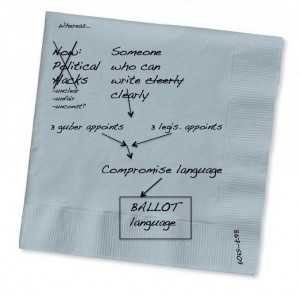This year, Minnesota Republicans are pushing two controversial constitutional amendments on the ballot, requiring voters to have photo IDs and banning gay Minnesotans from getting married. Why? Well, political operatives typically add constitutional amendments to the ballot for three primary reasons. The first two are fairly well-known:
CONVICTION. First, many genuinely believe in these issues. Much of the rationale for ballot initiatives is borne of politics, but some of it is borne of values and conviction. Some really do view unfamiliar forms of love and commitment as a personal or cultural threat, for instance. It’s grossly misguided conviction, but it’s conviction nonetheless.
PARTICIPATION. Second, impacting turnout is also a primary goal of ballot initiatives. Political operators want the existence of the ballot questions to lure like-minded voters to the polls to help their candidates win. For instance, Republicans know that some on the Christian right hate gays more than they love Romney, so promoting an amendment to take away the rights of gays is their back door way of ensuring that unenthusiastic conservatives show up to hold their nose and vote for Romney. (And of course, in the case of the photo ID amendment, conservatives want to suppress long-term electoral participation of groups with an annoying propensity to vote against them.)
Finally, there is a third, less discussed, reason ballot initiatives are promoted:
DISTRACTION. Beyond conviction and turnout-related motivations, ballot initiative proponents often hope to distract their opponents from the primary electoral task at hand. In 2012, Republicans put the photo ID and marriage ban questions on the ballot to spread liberal donors and volunteers thin, and distract them from other important campaign tasks.
I was reminded of this distraction motive when recently visiting with a friend who is very involved in supporting a school levy referendum issue in his community. While my friend is a strong opponent of the idiotic marriage ban amendment promoted by Republicans, he was lamenting the fact that it was difficult to get liberal volunteers and donations for the school funding campaign, because there is so much energy rightfully flowing into playing defense on the Republicans’ marriage ban. I’ve heard candidates say the same thing.
I’m not arguing that civil rights is less important than school funding, or vice versa, I’m just pointing out that the conservative ballot initiative shenanigans do, to some extent, tie liberal activists into pretzels. When liberals are playing defense on attempts to deny marriage and voting rights, they have fewer volunteers and dollars to play offense when it comes to Issue A and Candidate B. It’s subtraction by addition, and it’s very intentional.
But the question remains, will it work out as Republicans intended? GOP amendment sponsors should be wary of that old Law of Unintended Consequences. The marriage ban amendment has lit a fire under a large, passionate and well-funded army of GLTB-supportive donors and volunteers, and that army will be driving turnout on Election Day that will help liberals up and down the ballot. A polarizing issue like gay marriage generates more turnout on both sides. Historically, it has produced a net benefit for conservatives. But polls show that the popular tide is rapidly turning on that issue, and this could be the year that the existence of this GOP-sponsored issue on the ballot actually helps liberals more than conservatives.
– Loveland
Note: The post was also featured in the Politics in Minnesota Morning Report’s “Best of the Blogs” feature.


